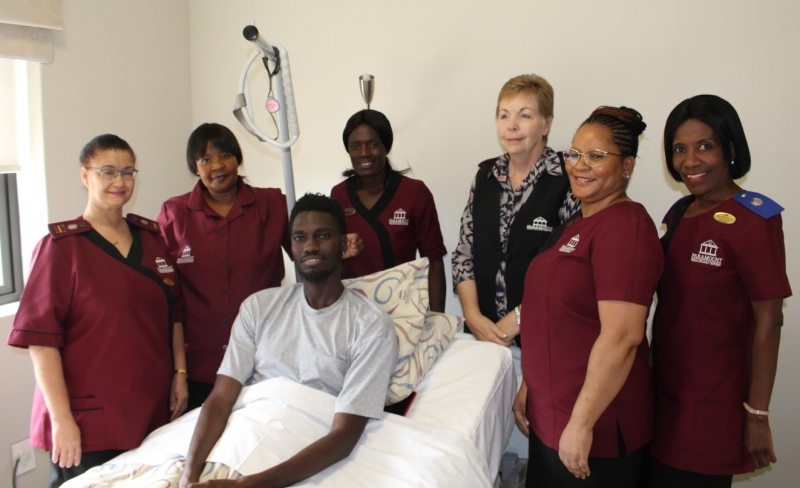
≡
We provide intensive sub-acute and rehabilitation services to patients that no longer require critical care but are not ready to return home.

Personalized care is provided 24 hours a day, seven days per week by qualified nursing staff in accommodation that is fitted with a 24-hour nurse call system.
Our services include: skilled nursing care, rehabilitation and therapy services by local doctors, physiotherapists, occupational therapists and speech therapists.
Paramount Healthcare centre support NAMAF in its quest for affordable healthcare and as such, abides by the NAMAF benchmark rates.
The term "Sub-Acute" is used in contrast to acute which indicates very sudden onset or rapid change and chronic which indicates indefinite duration or virtually no change. A chronic condition is one lasting 3 months or more, by the definition of the U.S. National Center for Health Statistics. The "father of medicine" Hippocrates distinguished diseases that were acute (abrupt, sharp and brief) from those that were chronic. Sub-Acute has been coined to designate the mid-ground between acute and chronic. Sub-Acute care is a relatively new and a rapidly growing medical care. It merges the sophisticated technology of a hospital and the efficient operation of a skilled nursing facility to reduce the cost of services while maintaining the high quality of care.
Sub-Acute care has emerged as one of the key solutions to reforming the American health care delivery system – and it is vastly growing in Southern Africa.
As a result, certain nursing facilities / hospitals are dedicating entire wings, even entire facilities, to provide high-tech, hospital-like medical care to seriously ill patients of all ages at half the cost of hospital-based facilities.
The American Health Care Association (AHCA), the Joint Commission on Accreditation of Healthcare Organizations (JCAHO), and the Association of Hospital-Based Skilled Nursing Facilities have developed a definition of Sub-Acute care:
“Sub-Acute care is comprehensive inpatient care - designed for someone who has an acute illness, injury, or exacerbation of a disease process. It is goal oriented treatment rendered immediately after, or instead of, acute hospitalization to treat one or more specific active complex medical conditions or to administer one or more technically complex treatments, in the context of a person's underlying long-term conditions and overall situation.
Generally, the individual's condition is such that the care does not depend heavily on high-technology monitoring or complex diagnostic procedures. Sub-Acute care requires the coordinated services of an interdisciplinary team including physicians, nurses, and other relevant professional disciplines, who are trained and knowledgeable to assess and manage these specific conditions and perform the necessary procedures It is generally more intensive than traditional nursing and less than acute care. It requires frequent (daily / hourly) recurrent patient assessment and review of the clinical course and treatment plan for a limited (several days to several months) time period, until the condition is stabilized, or a predetermined treatment course is completed.
At present, not even the USA has adopted a standard definition for Sub-Acute care, nor adopted a specific reimbursement mechanism for Sub-Acute care. Nonetheless, the industry in America and Southern Africa is taking shape swiftly as managed care entities, Medical Aid Fund case managers, insurers, and lawmakers look to Sub-Acute care as a promising source of relief to an overburdened and unaffordable health delivery system.
In general, nursing facility Sub-Acute units offer a wide variety of medical, rehabilitative, and therapeutic services at comparable quality to hospital services.
Conditions treated in these units can include brain and spinal cord injuries, neurological and respiratory problems, cancer, stroke, AIDS, and head trauma.
Because Sub-Acute patients require highly skilled care, the nursing facilities that serve them use a team approach to patient treatment. Doctors, therapists, nurses, and other health professionals all work in concert with the patient and his or her family.
Sub-Acute patients generally need between four and seven hours of skilled nursing care each day, compared to eight or nine hours for acute hospital patients. The average length of stay in a nursing facility Sub-Acute unit ranges from a few days to three months, although some people might need care for up to a year or two which then becomes frail care patients. Most Sub-Acute patients are elderly; about one third are younger than age 65. According to AHCA's 1996 Facts and Trends: The Sub-Acute care source book, 82 percent of patients was referred to nursing Sub-Acute units by hospitals or the patient's physician.
Below are the official Operating Hours for the Paramount Healthcare Center Sub Acute division.
Below is the Contact Details for the Sub-Acute division.

Please rate the service you received during your visit at Paramount Healthcare Center, between one a...